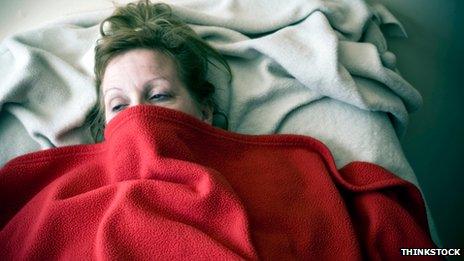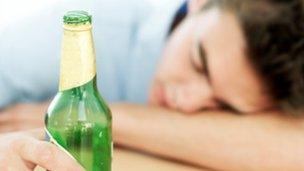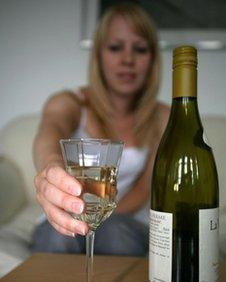Can a pill cure hangovers?
- Published

Blowfish tablets claim to cure hangover symptoms. But doctors say that masking the pain may make things worse.
For those who plan to celebrate the New Year with a few toasts but aren't looking forward to the inevitable hangover, a new pill on the market may resolve the dread of the day after.
Tablets called Blowfish have recently been permitted by the US Food and Drug Administration (FDA) to be sold as an over-the-counter drug. Their creator guarantees their effectiveness in chasing away the post-booze blues.
Nevertheless, some in the medical field remain sceptical, warning that such pills should not be seen as a licence to overdo the drinking.
Brenna Haysom, founder and president of Rally Labs, the company which creates Blowfish, told the BBC that the development of the remedy came out of her own experience.
"I was a hangover sufferer," she says. "I worked hard in finance, many times into the weekend, and needed to function well the next day while still enjoying my free time."
Simple formula
Ms Haysom says she tried different hangover remedies on the market to no effect.
She then decided to delve into the causes and effects of hangovers, experimenting with different combinations of ingredients, first on herself and then on her friends.
"After a lot of trial and error I realised that I was on to something: a reliable, effective hangover cure," she says.

On January 1, revellers are prepared to feel pain
It's easy to imagine that this "cure" would contain secret ingredients mixed in a complicated formula, but this entrepreneur admits that her anti-hangover pills are "nothing special".
They are basically a blend of high doses of aspirin and caffeine packed in effervescent tablets that dissolve in water, to drink in the morning. The two ingredients work together to fight fatigue and pain, two main complaints of hangover sufferers.
It also contains a little something sweet to help the medicine go down.
"We spent a lot of time on flavouring to make it palatable," she says.
Blowfish is not the first treatment aimed at hangover sufferers.
"Every year there is a new product out that claims to be the cure against hangovers," says Richard Blondell, vice-chair for Addiction Medicine at the American Academy of Family Physicians.
"Blowfish is simply this year's thing," he says.
'Marketing scheme'
Indeed, products like HangoverBuster, Alcohol-X and Chaser Plus have been on the market for years, all promising fantastic results.
Blowfish, however, is the only hangover medication to receive FDA acknowledgement, since it uses drugs approved by that agency.
Other hangover remedies use herbal supplements, which are unregulated by the FDA.
As none of the components of Blowfish are new, the FDA process was not as stringent as it would have been for an original drug.
Instead, the agency determined that the product was compliant with the FDA's over-the-counter monograph process. That ensures that products are made of previously approved substances, include safe doses and are properly labelled.
The FDA concluded that Blowfish was not misleading consumers by promoting itself as a hangover aid.
Dr Blondell, who advises that not getting drunk is the best and only real cure for hangovers, doubts the effectiveness of most treatments.
"They are a good marketing scheme," he says.
More importantly, the tablets can't undo the damage done by a hard night on the town, which can include strain on the liver, poor nutritional choices and embarrassing Facebook photographs.
"It's like saying to an obese person to eat all they want because there is a pill that will cure heartburn, but the calories are already inside."
Despite of such scepticism, Ms Haysom says that her product has had a "great response", with comments on the Blowfish Facebook page suggesting it has "saved Christmas."
Natural punishment
Is this treatment just a licence to drink in excess without having to pay the consequences later?
Hangovers function as a kind of punishment that keeps people from over-indulging too often, says Dr Aaron White, a neuro-scientist with the National Institute for Alcohol Abuse and Alcoholism.

Hangovers are one of the most unpleasant side effects of drinking
Dr White says that teenage and young adult binge drinking is a serious problem in the US.
What prevents young people from bingeing even more is not wanting to feel so awful afterwards, he says, so a drug that could take care of that situation would be of concern.
"It may change their relationship with alcohol and have them drink more often," he concluded, though notes that there is no evidence to suggest that hangover remedies increase drinking.
Ms Haysom rejects any suggestion that her product promotes heavy drinking.
"We are not saying 'take our product and all will be fine'," she says. "Alcohol is a poison and you will get a hangover as your body reacts to it. What our tablets do is treat the symptoms."
How effectively it treats the symptoms is another matter. Part of the reason there's been no effective hangover cure to this point is that scientists don't fully understand what a hangover is.
"You'd think we know the answers," says Dr White. "We're still trying to figure that out."
What they do know is that the complicated causes of hangovers affect individuals differently - so there may be no "one" cure that fits all sufferers.
That, of course, won't stop some New Year revellers for looking for a quick fix to start 2012 hangover-free.